What Is Dog Daycare? A Complete Guide for Pet Parents
PetSuites Daycare
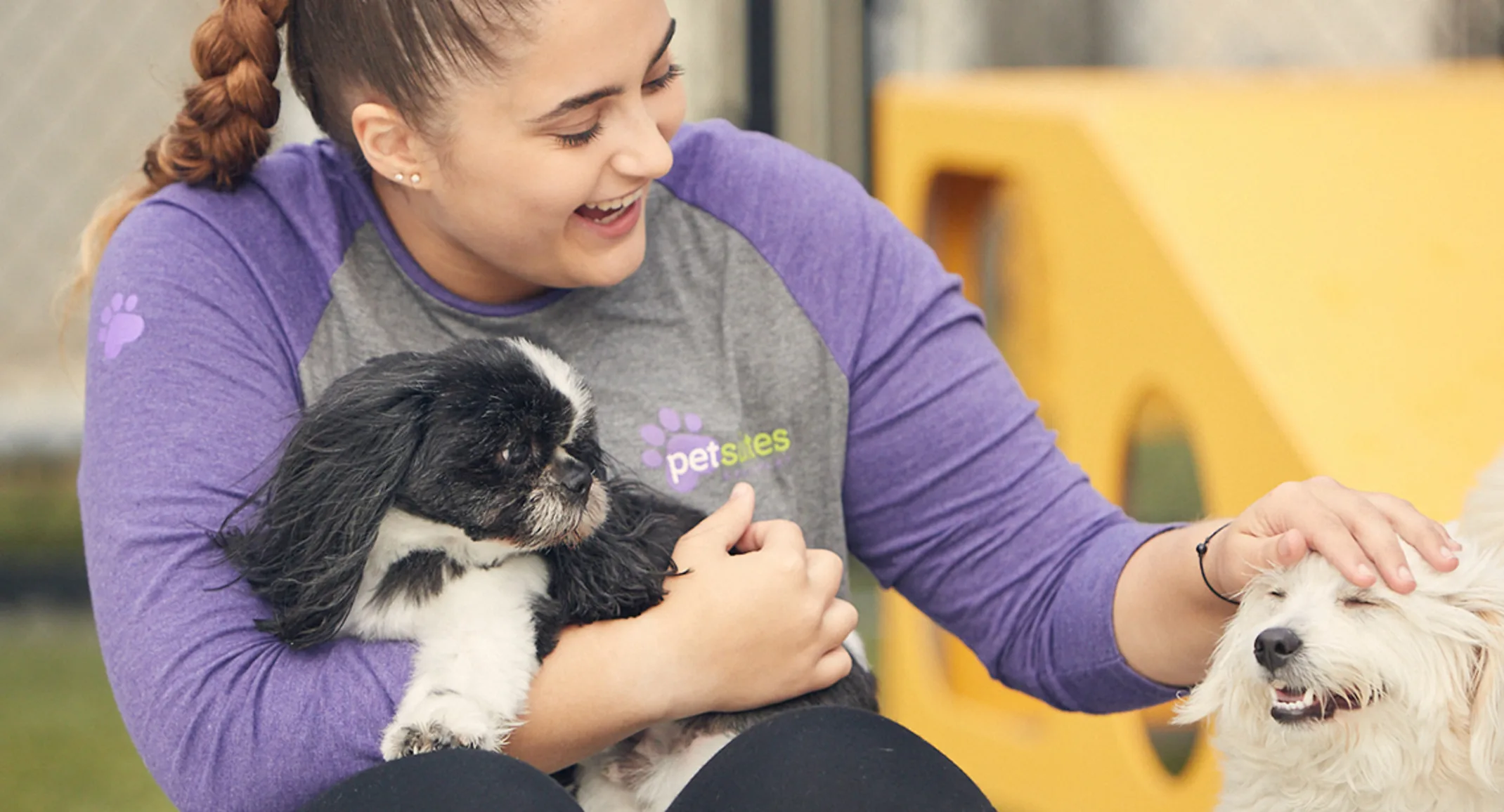
Between long workdays, errands, and busy schedules, it can be hard to give your dog the attention and activity they need every single day. That’s where dog daycare comes in. More than just a place to leave your pup while you're out, dog daycare provides an enriching, supervised environment where your dog can play, socialize, rest, and thrive!
Whether your dog is bouncing off the walls by lunchtime or you're simply looking for peace of mind while you're at work, daycare may be the perfect solution. In this guide, we break down how dog daycare works, what you can expect, and how to decide if it's right for your furry family member.
Quick Guide: Dog Daycare Basics
What is dog daycare?
A daytime service where dogs socialize, play, and rest under supervision in a structured environment.
What types of dog daycare exist?
Options include traditional daycares, in-home daycares, and those with added services like grooming or training.
Why choose dog daycare?
Great for dogs who need exercise, mental stimulation, and companionship while you’re away.
Are there risks with dog daycare?
Minor illnesses or behavior issues can occur, but quality facilities work hard to prevent them.
How to choose a dog daycare?
Look for trained staff, structured routines, clean environments, and strong safety protocols.
What Is Dog Daycare?
Dog daycare is like a school or day camp for your dog. It’s a place where dogs can spend the day in a stimulating, structured, and supervised setting while you handle work, errands, or other obligations. Dogs at daycare get the chance to socialize with other pups, play to their heart’s content, and return home tired, happy, and fulfilled.
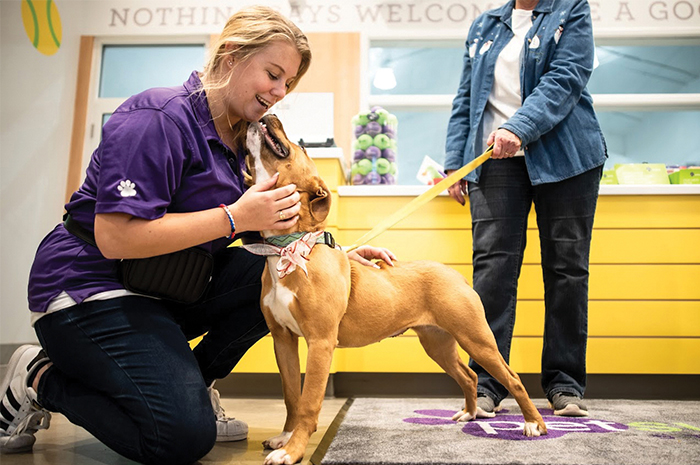
Daycare is ideal for high-energy dogs, social butterflies, or pups that get bored or anxious when home alone. That being said, many facilities also welcome dogs who prefer a more relaxed experience. Options like individual playtime, smaller playgroups, or calm luxury suites ensure that dogs of all personalities and energy levels can enjoy daycare at their own pace.
It’s all about helping your dog stay happy, healthy, and well-behaved while giving you flexibility and peace of mind.
Types of Dog Daycare Facilities
Daycares come in a variety of shapes and sizes, and it's important to find one that matches your dog’s needs, personality, and energy level. Here are the most common types of daycare environments:
Traditional Daycare Facilities
Indoor/outdoor play yards, multiple play groups, trained staff, and structured routines
Ideal for social dogs that enjoy lots of activity
In-Home Daycare
Small-scale care in someone’s home. Often quieter and more personalized
A good fit for shy or senior dogs who need a slower pace
Breed or Size-Specific Daycares
Tailored environments for small dogs, seniors, or certain breed types
Helps minimize overwhelm and mismatched play energy
Daycare + Training/Grooming Services
Some facilities offer additional perks, like training sessions or grooming appointments during the day
Learn everything you need to know about dog grooming by visiting our grooming guide for pet parents
Benefits of Dog Daycare at a Professional Facility
Dog daycare isn’t just convenient; it can make a real difference in your dog’s behavior, routine, and overall well-being. Here are some of the biggest benefits:
Socialization: Daycare helps dogs learn how to interact appropriately with others in a controlled, supervised environment. Regular socialization can reduce reactivity, build confidence, and make your dog more comfortable in everyday situations like walks, vet visits, or meeting new people and pets.
Exercise & Mental Stimulation: Most dogs don’t get enough physical or mental activity when left alone at home. Daycare provides opportunities to run, play, explore new environments, and engage in enrichment games that help keep both their bodies and minds active.
Routine & Structure: Dogs thrive on predictable schedules. Daycare provides a consistent daily rhythm that can help with house training, reduce anxiety, and support better behavior at home.
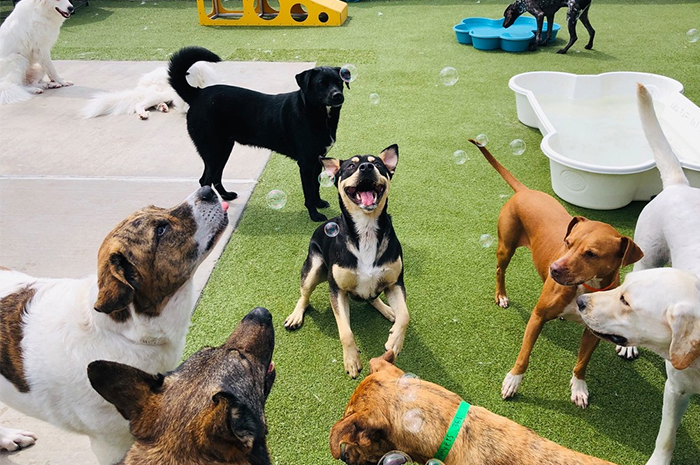
Peace of Mind: Knowing your dog is safe, supervised, and having fun while you’re at work or away makes your day less stressful. Many daycares also have webcams, send photos, updates, or report cards so you can check in on how your pup is doing.
All Day Play: Many dog daycare facilities offer all-day play options, meaning dogs can stay in group play throughout the day instead of being limited to short sessions. This setup encourages dogs to pace themselves, helping them learn valuable self-regulation skills. Over time, dogs begin to recognize when it’s time to rest, and they often choose to take breaks on their own, even in a stimulating group environment.
Being part of a group all day also helps dogs develop better social awareness. They learn to read cues like when another dog is done playing or when it’s okay to engage again. These skills are especially valuable for young dogs, who benefit from observing different play styles and energy levels.
It’s important to note that just because a facility offers all-day play doesn’t mean every dog is in group play nonstop. Puppies, seniors, or dogs with special needs may still take breaks or rotate in and out of playgroups as needed. But having the flexibility of all-day play ensures there’s always engagement available when your dog is ready for it.
At the end of the day, dog daycare is more than just a convenience, it’s a way to support your dog’s emotional and physical health. Whether your pup thrives in high-energy playgroups or prefers quiet companionship and enrichment, a quality daycare offers the structure, socialization, and stimulation that many dogs need to feel their best.
How Dog Daycare Works
Every daycare is a little different, but most follow a similar process designed to keep your dog safe, comfortable, and engaged. Depending on the facility, getting started with daycare typically includes:
Meet & Greet: Many daycares require a trial day or temperament assessment to ensure your dog is a good fit for the group.
Vaccination Check: Up-to-date rabies, distemper/parvo (DHPP), and bordetella are often required but this depends on the facility. Flea/tick prevention is also expected.
Daily Routine: Your dog will follow a predictable schedule including check-in, group play, rest periods, potty breaks, snacks or meals (if provided), and pickup.
Pick-Up Time: Many dogs are exhausted after a full day of play, don’t be surprised if yours heads straight for a nap!
Some daycares provide digital updates, report cards, or even webcams so you can check in throughout the day. Need to have your dog cared for longer than just the day? A lot of facilities that offer dog daycare will also offer boarding, be sure to check out our guide on dog boarding before booking a stay!
A Day in the Life at Dog Daycare
Consistency and structure are key when it comes to daycare. Dogs thrive on routine, and most daycares stick to a reliable schedule to keep pups happy and balanced.
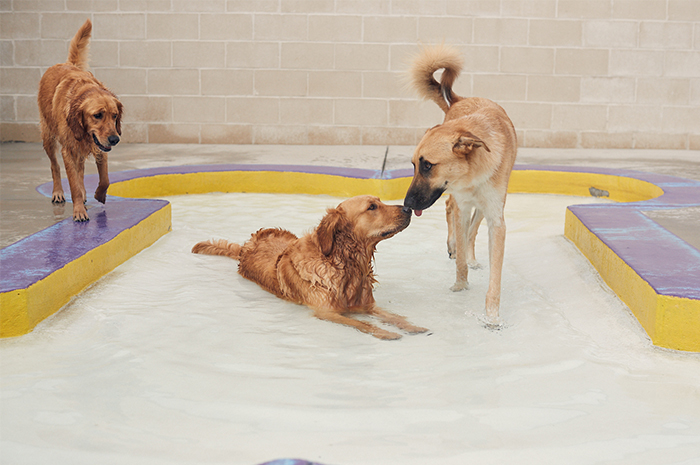
A typical day at dog daycare could look like:
Morning:
Drop-off and check-in
Group play or enrichment activities
Midday:
Nap or quiet time
Snack or lunch if applicable
Afternoon:
Additional playtime or training sessions
Individual attention or enrichment toys
Evening:
Wind-down, clean-up, and pickup
Some daycares also incorporate structured enrichment such as:
Agility courses
Splash time or swimming in pools depending on location
Scent work and puzzle toys
Other enrichment activities
These activities help provide mental stimulation and support behavioral development. Depending on the facility, a day at daycare could look very different from what has been described above, so be sure to ask about this if you are curious.
Is Dog Daycare Right for Your Dog?
Dog daycare can be a great outlet for many dogs, but it’s not right for everyone. There are various factors to consider when deciding if daycare is a good fit.
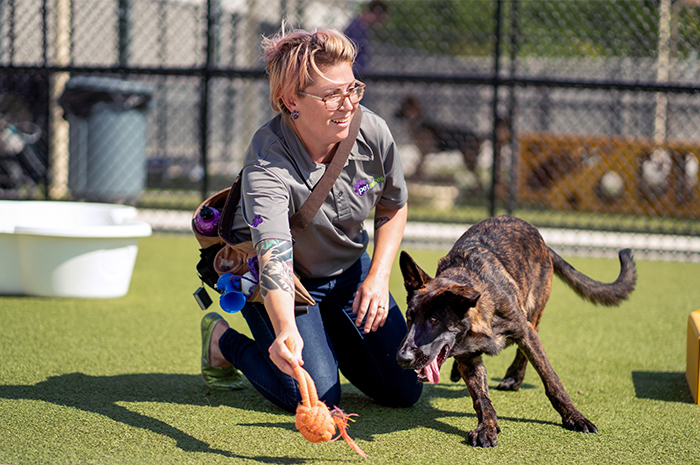
Dog daycare is best for dogs who:
Are well-socialized and comfortable around other dogs
Are vaccinated and in good health
Are not aggressive or reactive
Are spayed/neutered if over a certain age (usually 6-8 months)
If your dog has separation anxiety or fear-based behaviors, a gradual introduction or behavior consult may help them adapt. Some facilities offer solo play or quieter environments for dogs that need a gentler pace. Be sure to communicate with staff about any potential issues your dog may have, and ideally, they will be able to address your concerns!
How Much Does Dog Daycare Cost?
Cost can vary depending on your location, the services offered, and facility features. Here are general price ranges to expect:
On average, a full day of dog daycare can cost between $27-44+ depending on various factors
Packages: Many daycare facilities offer package options or dog daycare memberships to make regular daycare more affordable and convenient.
Depending on the facility, additional charges may include:
Medication administration
Late pickup
Grooming or training add-ons
How to Choose the Right Daycare
Not all dog daycares are created equal, so it’s important to find one that aligns with your expectations and your dog’s needs. Touring the facility and speaking with staff can give you a good feel for the environment.

While taking a tour or on the phone, ask questions like:
What is your staff-to-dog ratio?
How are dogs grouped for play?
What training do your staff members have?
What happens in case of illness or injury?
Are play areas supervised at all times?
Do you offer trial visits or tours?
Trust your instincts. A calm, clean space with friendly staff and happy dogs is always a good sign!
What to Pack for Dog Daycare?
Packing for daycare doesn’t need to be complicated. Here's what most facilities recommend:
Labeled food and treats (if needed)
Medications and instructions (if needed)
Leash and collar with ID
Check with your local daycare for their specific packing list. Some facilities provide all essentials, while others prefer you bring your own.
Potential Risks & How Daycares Manage Them
Dog daycare offers many benefits, but like any group environment, there are a few potential concerns to be aware of:
Illness: Canine cough, stomach bugs, or parasites can occasionally spread. Good daycares sanitize frequently and enforce strict health rules. Be sure to ask your dog daycare facility about vaccine requirements.
Injuries: Scratches or scuffles can happen, especially with energetic dogs. Trained staff reduce this risk by managing group dynamics. Ask if your facility has a relationship with a local vet for emergency situations.
Stress: New experiences can be overwhelming at first, but most dogs adapt quickly. Trial days can ease the transition.
Reputable pet daycare facilities will take extensive measures to minimize the risk of illness, injury, and stress through thoughtful facility design, staff training, rigorous sanitation standards, behavior evaluations, safety protocols, and vaccine requirements. Pet parents also play a vital role in keeping their own pets and all pets in the resort’s care, safe and healthy by providing accurate health and behavior histories, maintaining up-to-date vaccinations and parasite control, keeping ill pets at home, and informing staff of any special care needs.
What Is Puppy Preschool?
Many daycare facilities offer puppy preschool programs designed specifically for young dogs between 3 and 6 months old. These programs provide a safe, structured space where puppies can develop key life skills, build confidence, and learn how to interact with other dogs.
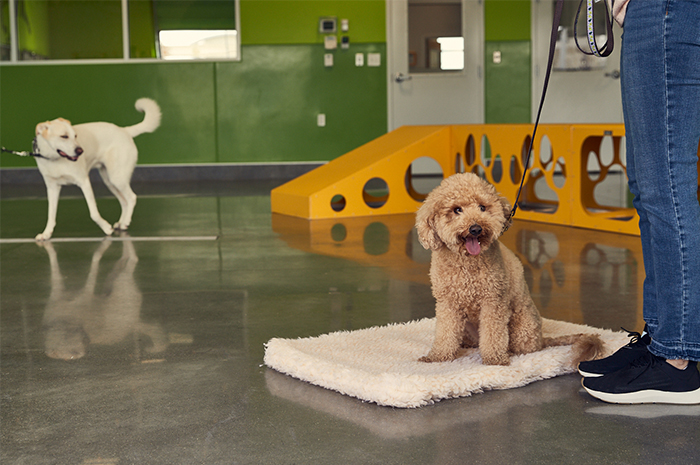
Puppy Preschool typically focuses on several core areas:
Socialization
Early exposure to other puppies and new environments helps your pup learn healthy play behaviors and reduces fearfulness around new dogs or people later in life.
Confidence Building
Regular crate time and structured potty walks can help young puppies adjust to routines and become comfortable spending time away from home. This builds confidence and can ease the transition to being left alone as they mature.
Problem-Solving and Enrichment
Puppies have curious minds that need stimulation. Preschool programs incorporate interactive games and enrichment toys to encourage problem-solving and keep young brains engaged.
Puppy Etiquette
Through guided play sessions, puppies learn bite inhibition, how to read other dogs’ signals, and how to engage in gentle play. All important lessons that will serve them throughout their lives!
Puppy Preschool offers an ideal way to give your young dog the right start, helping them grow into a well-rounded, confident companion. It also gives pet parents a little extra support during those busy early months.
Dog Daycare FAQs
How old does my dog need to be for dog daycare or puppy pre-school?
Most facilities require dogs to be at least 12–16 weeks old and fully vaccinated. For puppy pre-school, most facilities require that your puppy is at least 8 weeks old and may have specific vaccine requirements. Be sure to check with the facility for their exact guidelines.
Will my dog be supervised the whole time at dog daycare?
Yes. Reputable daycares always have staff present during play.
What if my dog doesn’t like dog daycare?
Some dogs thrive in daycare, while others prefer solo time. That’s okay! You can ask your dog daycare if they offer individual play, rooms, or other solutions for dogs who are not adjusting well.
Will my dog be tired after daycare?
Yes, and that’s usually a good thing! Many dogs come home relaxed and ready to snooze after a full day of play.
Final Thoughts
Dog daycare can be a wonderful way to give your pup exercise, mental stimulation, and safe socialization while providing you with peace of mind during your busy day. Whether your dog thrives in an active playgroup or prefers a quieter pace, the right daycare can enrich their routine and support their well-being.
Not sure where to find a facility? Explore dog daycare facilities around the country.
Why Pet Parents Trust PetSuites for Dog Daycare
With over 90 locations nationwide and more than 20 years of experience, PetSuites provides exceptional dog daycare built around safety, enrichment, and fun. Our spacious indoor and outdoor play yards, trained caregivers, and thoughtfully designed routines help every dog feel right at home, whether they love to romp with a pack or prefer quieter one-on-one attention.
Ready to give daycare a try? See firsthand why PetSuites is the leader of the pack in pet care with your dog’s first day of daycare completely free or get 30 days of daycare for only $99!
Our information is developed in close collaboration with our expert team of dog caregivers, trainers, and groomers - people who live and breathe pet care every day. Whether you’re exploring daycare options for the first time or you're a seasoned traveler looking for a trusted partner, you can count on PetSuites to deliver expert insight and loving care tailored to your pet’s unique needs. At PetSuites, this isn’t just what we do; it’s who we are. Because your pet deserves a stay that’s safe, happy, and full of tail wags!
